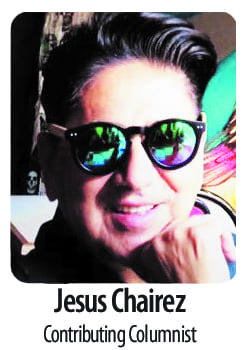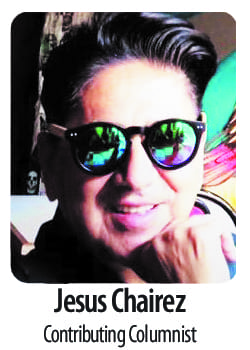Dallas’ LGBT Latino history site is born
 Recordando: It’s Spanish for “remembering.”
Recordando: It’s Spanish for “remembering.”
I have documented my life through photographs because my parents didn’t. With nine people in our family,taking photos and processing film were a luxuries they couldn’t afford. That was long before digital cameras and cell phones, of course.
I was in my mid-twenties when I first got involved in LGBT activism, helping form Dallas’ first LGBT Latino organization, the Hispanic Coalition de Dallas. That was in the early 1980s. I took pictures then, too, and saved news clippings about the organization and its activities. But that was all lost when I handed over the scrapbook to the organization’s last president, in 1988, after he disappeared and the organization folded.
When I started Dallas’ — and North Texas’ — first bilingual Latino LGBT radio show, Sin Fronteras, in July 1993, I once again started documenting progress with photographs and news clippings. But I wasn’t really thinking back then about saving Dallas’ LGBT Latino history.
After Sin Fronteras went off the air in July 2005, a friend was looking at my scrapbook. He said to me, “Mujer [girl], you have a wonderful gay Latino history book here. You are like a living dinosaur for our gay Latino community.”
I realized that was true.
Beginning in the spring of 2011, I started participating in a LGBT Latino history project, co-authoring a book called Queer Brown Voices, Personal Narratives of Latina/o LGBT Activism. It is a collection of essays chronicling the experiences of 14 Latina/o LGBT activists from across the U.S.A., that was ultimately published in September 2015.
When The Dallas Way: The Dallas GLBT History Project was formed, I participated by telling my story at an Outrageous Oral event in September 2012.
So documenting Dallas’ LGBT Latino history has always been important to me. One of the reasons it is so important for those of us in that community to keep those records is that our LGBT Latino accounts aren’t included in the mainstream mix of Dallas’ overall LGBT history. Latinos, like most people of color, are often ignored. (Think #GayMediaSoWhite here).
Then, in the spring of 2013, I met with Joe Perez, an original member of the Gay Hispanic Coalition de Dallas, and Rosa Lopez, founding member and co-chair of the Lesbianas Latinas de Dallas, to discuss how to save our LGBT Latino history. Instead of complaining, we just decided to save our history ourselves.
Joe Perez had saved things from the coalition for his own personal pleasure, not because he was thinking about preserving LGBT Latino history. He had in his possession things I thought of as the Holy Grail of Dallas’ gay Latino past.
Rosa Lopez had a scrapbook filled not with pictures, but with agendas and newsletters. To top it off, I had materials from my radio show Sin Fronteras. All of these things were important artifacts of our history.
The three of us met a couple of times, but then we got sidetracked. And I moved back to México City.
Still, recording Dallas’ LGBT Latino history was always at the back of my mind, and ultimately, I was able to document Joe’s scrapbook during an October 2016 visit. I planned to document Rosa’s scrapbook next, during a visit planned for the spring of this year, when I will be back in Dallas on business.
But Rosa’s cancer, which had been in remission, came back, more aggressive than before. And in the last week of January, Rosa’s niece sent me an email letting me know that Rosa’s time was short.
So I immediately got on a plane to Dallas to visit with Rosa. We spent some time together and I was able to record her story, via an audio interview, and to document her scrapbook.
It was our final project together.
Rosa’s life was ending, and in an effort to preserve her legacy and our LGBT Latino history, I created “Remembering – Recordando: a Dallas Latina/o LGBT History Viewpoint,” and finally putting all of our material on the Internet.
Since I had no historical material from Dallas’ first Gay Latino bar, Bamboleo’s, I contacted Carl Smith, the last remaining owner of the bar, for any information he had. Fortunately, Carl had saved his Bamboleo’s material digitally, because, he said, he knew that “Bamboleo’s was making history and changing the culture of the LGBT community, not just the LGBT Latino community, and that [the information] needed to be preserved and shared.”
“Remembering – Recordando” includes Rosa’s portrait, her scrapbook and our last audio interview. Also included is Joe’s and my scrapbooks, and pictures and video from Bamboleo’s that Carl added.
Others have also started to add materials. And I will be adding items as I find them; I’m searching for all pictures and information from the community referencing the LGBT Latino.
For example I would love to have photos from Cruz’s Café, a gay Latino Tex-Mex restaurant once located Cedar Springs Road, next door to where Street’s Fine Chicken is now. And before Bamboleoss, there was Hugoss a small Mexican cantina once located on Maple Avenue, between Reagan and Throckmorton Streets.
I would love to add pictures of any activities from the Lesbianas Latinas de Dallas days — or any other organization or activity related to the LGBT Latino community in North Texas. If there are organizations or events that I don’t know about, please let me know.
“Remembering — Recordando: a Dallas Latina/o LGBT History Viewpoint” is a work in progress, and I always looking for more stories to add, in English or Spanish. I hope others will join in to preserve this almost-lost history of our community and our movement.
Jesus Chairez is a former Dallasite now living in Mexico City. He was the producer and host of North Texas first bilingual LGBT Latino radio show, Sin Fronteras, on KNON 89.3 FM and is an author published in the book, Queer Brown Voices: A Collection of Personal Narratives of Latina/o Activism. He can be reached at facebook.com/JesusChairez.
This article appeared in the Dallas Voice print edition March 10, 2017.

